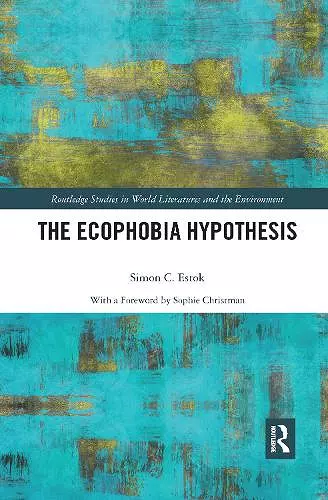The Ecophobia Hypothesis
Understanding fear and love in human-environment relations
Format:Paperback
Publisher:Taylor & Francis Ltd
Published:18th Dec '20
Currently unavailable, and unfortunately no date known when it will be back
This paperback is available in another edition too:
- Hardback£145.00(9781138502055)

This insightful volume examines the limitations of the biophilia hypothesis and introduces the concept of ecophobia as a critical factor in understanding human-environment relations.
The Ecophobia Hypothesis explores the limitations of the biophilia hypothesis as a model for understanding human-environment relationships. While biophilia highlights positive human connections with nature, this volume argues that it fails to account for the complexities of our current ecological crisis, particularly in the context of the Anthropocene. By expanding the concept of biophilia to include a spectrum of un-philic behaviors towards the natural world, the book presents a nuanced view of our interactions with the environment.
In its investigation, the Ecophobia Hypothesis delves into the urgent need to address the role of genetic agency and the implications of ecophobia—fear or aversion to ecological themes. The text weaves together comparative discussions that highlight the complexities of 21st-century representations of ecophobia and how our fears shape perceptions of an increasingly hostile natural environment. This multifaceted approach emphasizes that understanding ecophobia is crucial for fostering a deeper connection with nature.
The book posits that ecophobia is a significant factor contributing to the ineffectiveness of ecomedia in promoting transformative change. By examining the interconnections between speciesism, environmental ethics, and the societal infrastructures that perpetuate ecological harm, the Ecophobia Hypothesis aims to reveal the roots of our ecological challenges and inspire meaningful action towards a more sustainable future.
Well researched, vigorously argued, and capaciously framed, The Ecophobia Hypothesis culminates years of careful work by Simon Estok on the intimacy of contemporary environmental catastrophe to an enduring human fear of the natural world—a horror that needs to be thought alongside the much documented love of life which occupies much environmental writing. This book will deeply unsettle its readers. Yet it also offers wider historical, psychological, and material understandings of how we arrived at our state of unremitting crisis ... and why disruption of our comfortable eco-epistemological frameworks is so necessary now. —Jeffrey J. Cohen, Co-President, Association for the Study of Literature and Environment (ASLE), Dean of Humanities, Arizona State University, USA
At the conclusion of his much anticipated, deeply learned, and clearly written study Simon Estok writes that "Understanding how ecophobia prompts environmental injustice (and environmental racism) produces a more comprehensive and wider understanding of the mutually reinforcing ethics that bring about oppression and suffering—social and environmental. Understanding this is what the ecophobia hypothesis seeks." Beginning with exposing the human fear of nature, Estok considers a fresh methodological model in the examination of our complicity in climate change, the most pressing concern of our times. The Ecophobia Hypothesis is essential reading for all students of interdisciplinary literary studies, critical theory and concepts, feminist literature and theory, and of course environmental studies. —William Baker, Distinguished Professor Emeritus, Northern Illinois University
Simon Estok has written his long-awaited, masterful, invigorating, exhaustive, and unequivocally convincing thesis that confronts and corrects the notion of biophilia. Estok is at his very best here. Sure-footed on the slopes of theory, graceful on wing in the skies of controversy, and unrelenting in the arts of persuasion, Estok dazzles with his wide-ranging discussions about ecophobia—discussions that range from the dangerous shoals of genetic materialism to the more calm waters of ecomedia, animal studies, and evolutionary psychology. From its startling insights about "hollow ecology" and "junk agency" to its unapologetic stance arguing the necessity of acknowledging the dark, antagonistic, and exploitative responses and reflexive fears that characterize so much of the collective human response to nature, The Ecophobia Hypothesis is a "must-read" for anyone in the environmental humanities. —Dr. Jonggab Kim, Director of the Body Studies Institute, Konkuk University, Seoul.
Human interactions with the nonhuman world exhibit affinity, antagonism, and a vast array of complicated emotions between the two extremes. The psychology of human attitudes and actions toward nature is fascinating and difficult to explain. Relying on the evidence he finds in a wide range of cultural texts, Simon Estok explores the dark and fearful part of the emotional spectrum in this provocative study of "ecophobia." This may help to explain why our civilization treats the planet so callously. —Paul Slovic, Professor of Psychology, University of Oregon
The irrational fear of the things and beings of the natural world finds its best conceptualization in Simon Estok’s The Ecophobia Hypothesis. Estok’s riveting conjectures on ecophobia are not only theoretically cogent but also provide affective and cognitive insights into the darkness of human reflexes that induce what he calls "hollow ecology." Estok entangles the reader in the ecopsychological and ecocultural swings of the ecophobia condition through the intersecting mirrors of genetic materialism, animal studies, ecomedia, and ecopsychology. This book will open many eyes to the disquieting reality of humanity’s ecological unconscious and liberate the reader from the existential trouble that this unconscious represents. —Serpil Oppermann, President, the European Association for the Study of Literature, Culture, and the Environment of (EASLCE).
This bracing and wide-ranging book demonstrates the importance of Estok’s concept of ecophobia not only for ecocriticism and ecomedia studies, but for combating the proliferation of waste, the systemic violence toward nonhuman creatures, and the degradation of planetary life. — Stacy Alaimo, Co-President of ASLE (Association for the Study of Literature and Environment ).
ISBN: 9780367616649
Dimensions: unknown
Weight: 308g
198 pages